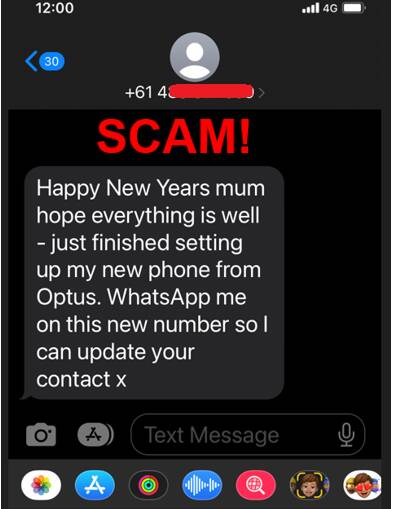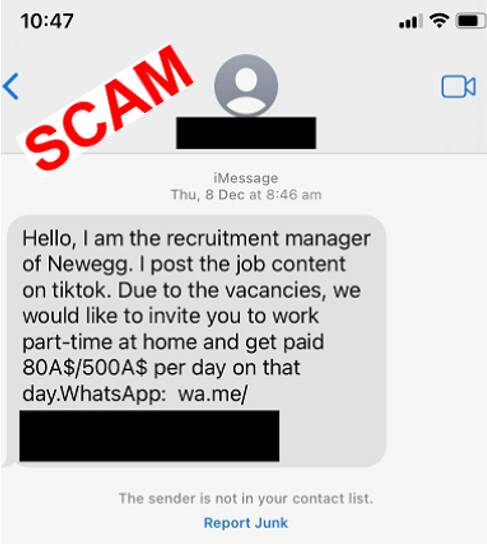Scams, and the con artists behind them, are forever evolving and becoming more sophisticated and harder to spot.
Subscribe now for unlimited access.
or signup to continue reading
Australian Community Media has compiled a list of current scams identified by sites such as scamwatch.gov.au, the Australian Competition and Consumer Commission (ACCC) and the Australian Communications and Media Authority (ACMA), which are dedicated to informing people about fraudulent and dishonest activities.
If you have been the victim of a scam report it to scamwatch.gov.au/report-a-scam.
Uber scams
- Scamwatch.gov.au is urging people to beware of Uber scams currently doing the rounds.
- The texts may claim your account has unusual activity or that your payment was unsuccessful.
- They all contain a malicious link to a website that will steal your details.
- Don't click the link, check your account via the app.
Scratchie scams

- Scamwatch.gov.au is warning consumers about fake scratchie scams.
- Scratchie scams will offer you an instant prize, but when you contact the trader to claim it, you will be asked to provide payment for various 'fees' via wire transfer or preloaded money card.
- The scammer may request bank details and photo identification. In some rare cases you may be asked to travel overseas to collect your winnings.
- The scam package may include professional-looking brochures, often for accommodation, which are designed to trick you into thinking the competition is legitimate. It may include contact details for a business overseas and a web address for a fraudulent but professional-looking website.
- The up-front payment requested can be as high as a few thousand dollars.
- If you pay, you will not receive the prize, and you will never see your money again. If you provide your personal details, they may be used for further fraudulent activity such as identity crime.
Chinese authority scams

- Scammers pretending to be from a Chinese Authority are calling people stating their id has been used in illegal and scam activity in China, according to Scamwatch.gov.au
- According to the website, the scammer may pretend to be from a Chinese authority such as the police, a government or immigration official, or a parcel delivery service.
- They may claim that you are in serious trouble as they have intercepted a package addressed to you with illegal material such as fake passports or credit cards or that your identity has been stolen or hacked and used for illegal activity.
- According to Scamwatch the scammer may threaten you'll be extradited to China to face criminal charges unless money is sent to them.
- They will claim this money is needed to prove your innocence while they investigate the supposed crime, but there is no crime. It is simply not true.
- If you ever receive a call from someone making threats about arrest or deportation, it is a scam.
- Hang up the phone immediately and report it to your local police or to Crime Stoppers on 1800 333 000.
- If you think the scammer has your bank account details, contact your bank immediately.
Scams target sports fans

- A recent spike in a scam operating on Facebook is targeting supporters of grassroots sporting clubs to gain credit card information and other person details.
- The scam involves the promotion of a livestream link to watch a match or event and once clicking on the link the user is taken to a page asking to sign up with personal information including credit card details.
- It is believed the scam is run using web bots and some links can often appear legitimate by drawing out information from the clubs' Facebook page.
- A spokesperson for the ACCC said there has been a significant increase in phishing scams on social media and it has received reports related to live sports subscription scams.
Report a scam
- If you suspect you've been targeted by scammers, www.scamwatch.gov.au/report-a-scam to make a report.
- If you've sent money or shared your banking details with a scammer, contact your financial institution immediately.
Weight-loss drug scams
- The Therapeutic Goods Administration (TGA) is aware of several scams targeting consumers seeking semaglutide (Ozempic) during the current medicines shortage and is urging consumers to only obtain these products from an Australian pharmacy and when dispensed on a valid doctor's prescription.
- The TGA is investigating a number of websites claiming to be selling products containing semaglutide, (trade name Ozempic), for the treatment of type 2 diabetes and off-label for weight loss.
- In some cases consumers who pay for products online fail to receive any product, while in other cases the product received is not semaglutide. Even for those individuals who receive semaglutide, it may not be medically suitable for them.
Threatening phone calls
- Scammers are continually using threatening and menacing tactics to try and scare their targets into action.
- Scamwatch is warning that scams involving fraudsters impersonating police or government agencies are doing the rounds again.
- Some scammers are falsely identifying themselves as a Federal Agent and telling victims they have identified suspicious activity linked to their bank accounts.
- They then request personal details, including a Medicare number, address, and bank details. The fake representatives ask their victim to deposit money into an AFP account.
- Scammers are also targeting people using email and social media with fake arrest warrants. The offenders then call their victims and demand payments ordering them to deposit money into a nominated bank account, transfer crypto currency, or purchase online vouchers.
- Some scammers ask their victim to meet in public to hand over money, or ask them to withdraw funds from their account and deposit into an AFP account.
- Phone calls from scammers may appear to come from a legitimate AFP number. In some reports, the scammers have managed to mimic an AFP number to disguise their identity. Police suspect these calls are actually coming from overseas.
Road toll scam
- Beware of threatening scam messages saying you haven't paid a road toll.
- If unsure, check your account by searching for your registration plate number on the road toll company's website or log in the usual way.
- Don't click on any links.
'Sextortion' scams
- Sexual extortion - sometimes called 'sextortion' - is a form of blackmail where someone threatens to share intimate images of you online unless you give in to their demands.
- Scammers are posing as romantic love interests on dating sites with a goal to obtain explicit photos or videos of victims.
- They then threaten to share them with their contacts unless they meet the scammer's demands.
- These demands are typically for money, more intimate images or sexual favours.
- According to esafety.gov.au, while sexual extortion can be used by individuals, organised crime is often behind it when the blackmailer demands money. Commonly the blackmailer is not based in Australia.
- Scamwatch is urging victims to report sextortion to police.
Streaming service scams
- Binge-watching your favourite shows during lockdown? Scamwatch is urging account holders to think twice before responding to a request from a streaming service to 'update your payment details'.
- Always double check the sender to avoid false billing scams.
- Scammers posing as a regular supplier may claim that their banking details have changed. They may tell you they have recently changed banks, and may use stolen letterhead and branding to convince you they are legitimate.
- They will provide you with a new bank account number and ask that all future payments are processed accordingly. The scam is often only detected when your regular supplier asks why they have not been paid.
Natural disaster scams

- Scamwatch.gov.au is warning people to be vigilent when it comes to scammers impersonating charities and asking for donations.
- These scams are common after natural disasters such as earthquakes.
- Fake charities try to take advantage of your generosity and compassion for others in need. Scammers will steal your money by posing as a genuine charity. Not only do these scams cost you money, they also divert much needed donations away from legitimate charities and causes.
- Scammers will pose as either agents of legitimate well-known charities or create their own charity name.
- Fake charities operate in a number of different ways. You may be approached on the street or at your front door by people collecting money. Scammers may also set up fake websites which look similar to those operated by real charities. Some scammers will call or email you requesting a donation.
- Warning signs may include: a website that looks identical to a legitimate charity site, changing only the details of where to send donations; the person collecting donations on behalf of the charity does not have any identification; you are put under pressure or made to feel guilty or selfish if you don't want to donate; you are asked to provide a cash donation as they don't accept cheques. Or, they want the cheque to be made out to them rather than to the charity; you are not given a receipt. Or, they give you a receipt that does not have the charity's details on it.
Ticket scams

- With major international acts heading to Australian stages this year, Scamwatch.gov.au and ticket company Eventbrite have warned consumers to make sure they are purchasing tickets from legitimate sources.
- According to Eventbrite, "scammers have flocked to every potential sales channel, from online marketplaces and social media to email and SMS, hoping to make a quick buck off dedicated fans who missed out on tickets."
- People are urged to look for telltale signs that the tickets may not be real, such as: language that doesn't seem quite right, mobile phone numbers and requests to text the seller upfront to make a purchase and requests for payment via vouchers or gift cards.
- Scamwatch recommends only purchasing tickets through official ticket suppliers and resale channels.
Payment scams
- Scammers are sending emails asking for a PayPal payment for a Google Pixel phone (or other goods) you never purchased, according to Scamwatch.gov.au.
- The invoice contains the scammer's phone number. Don't open the link or call the number, just delete the email.
What to do if you've clicked on a dodgy link
- If you've ever clicked a link in a scam message or email, you may be targeted in follow-up scams, according to Scamwatch.gov.au
- They may call or message you impersonating your bank offering to protect your money from the scam you received. Contact your bank on an independently sourced number to verify.
Pay ID scams
- Last year, Australians lost $260,000 to PayID impersonation scams, according to Scamwatch.
- PayID is managed by your bank so you will never be contacted directly.
- If you're unsure about an email or message, reach out to your bank and don't make any payments
New year, new scams

- Scamwatch is urging people to be wary of scams that target people looking to make a fresh start in the New Year.
- People looking for new jobs, new fitness or weight loss programs, new ways of saving or making money should show due diligence before handing over money or personal and financial details.
- The ACCC's Scamwatch is warning young people in particular, to protect their personal information when applying for jobs and to beware of job offers made through social media platforms or messaging services such as Whatsapp.
- Jobseekers are being urged to watch out for scammers, with new Scamwatch figures revealing Australians lost over $8.7 million to recruitment scams in 2022.
- The Australian Competition and Consumer Commission is also warning consumers to beware of weight loss shams when looking to fulfil a new year's resolution.
- These scams promise dramatic weight loss for little or no effort. They typically involve an unusual or restrictive diet, revolutionary exercise, a 'fat-busting' device or breakthrough pills, patches or creams.
- The ACCC also warns of investment scams targeting those who want to increase their savings rapidly during 2023.
- The majority of losses to investment scams involved crypto investments. Cryptocurrency is also the most common payment method for investment scams.
- Meanwhile, imposter bond scams usually impersonate real financial companies or banks and claim to offer government/Treasury bonds or fixed term deposits.
- Scamwatch warns never send money or give your personal information, credit card, online bank or cryptocurrency account details to anyone you don't know, especially if you've only met them online, through email or over the phone.

Beware the latest 'Hi Mum' scam
- A new text message reading "Happy New Years mum" and that the sender has "just finished setting up my new phone" and asking the receiver to "WhatsApp me on this new number so I can update your contact" has been making the rounds since Christmas, when many people received a new phone.
- If you receive this 'Hi Mum' message, stop and call the alleged sender on their usual number to confirm it's really them.
- Don't send money without speaking to the message sender first.
Be aware of event ticket scams
- Watch out for scammers when buying event tickets online. Some people have not received tickets they paid for and others received fake tickets.
- Do your research to ensure websites are safe and legitimate.
- If you have been scammed, report it to Scamwatch online at www.scamwatch.gov.au.
Look for red flags when buying online
- We all love a sale but beware of scams impersonating popular Australian retail websites. Scammers are selling items at big discounts.
- Scammers use the latest technology to set up fake retailer websites that look like genuine online stores. They may use sophisticated designs and layouts, possibly stolen logos, and even a '.com.au' domain name and stolen ABN.
- The biggest tip-off that a retail website is a scam is the method of payment. Scammers will often ask you to pay using a money order, preloaded money card, or wire transfer, but if you send your money this way, it's unlikely you will see it again or receive your purchased item.
- Remember, if an offer seems too good to be true, it probably is.
Look out for red flags when job hunting
Australian jobseekers lost more than $8.7 million to scammers posing as recruiters in 2022 but the real number is believed to be much higher.
Employment scams noticeably increased in the last three months of the year as many people considered a career change or finished studying, according to the Australian Competition and Consumer Commission.

"Thousands of young Australians have finished school and graduated from university with high hopes about their future careers and the intention to look for work in the new year. Unfortunately, they are being targeted by scammers," ACCC deputy chair Delia Rickard said.
"We know younger people are particularly vulnerable, with Australians aged between 25 and 44 reporting the biggest losses to job scams.
"If you are job hunting and you are offered work that requires little effort for a big financial reward it is most likely a scam. This might include repeatedly clicking a button on a website or app to purchase products or submit reviews."
More than 3194 reports of job scams made to Scamwatch in the past 12 months, with many of the victims were lured on the promise of making money quickly, the consumer watchdog said.
Many criminals posed as legitimate recruiters and sought out victims via social media, promising a job at a real company if they handed over money.

Scammers pretended to work for high-profile companies or online shopping platforms and contacted victims through targeted online advertisements or messaging forums.
Some schemes involved asking jobseekers to purchase large amounts of particular products through certain websites or submitting reviews.
"In the final months of 2022, we saw a significant uptick in reports and losses associated with recruitment scams and we are concerned these scammers will continue to ramp up their efforts as people look for work in the new year," Ms Rickard said.
"With many Australians looking to make the most of a highly competitive job market, we are urging jobseekers to be wary of opportunities that seem too good to be true. Never make a payment or upfront investment to secure a job. If you think you've been scammed, contact your bank or financial institution immediately."
Recruitment scam red flags include having to act quickly to secure a role, being offered a job without an interview, handing over personal details like bank account numbers or being asked to transfer to a third party.
Ms Rickard asked anyone who thinks they are caught up in a recruitment scam to contact Scamwatch and said they could seek help from cyber support charity IDCARE.
Click here to learn more about what reg flags to look out for when hunting for a new job.














